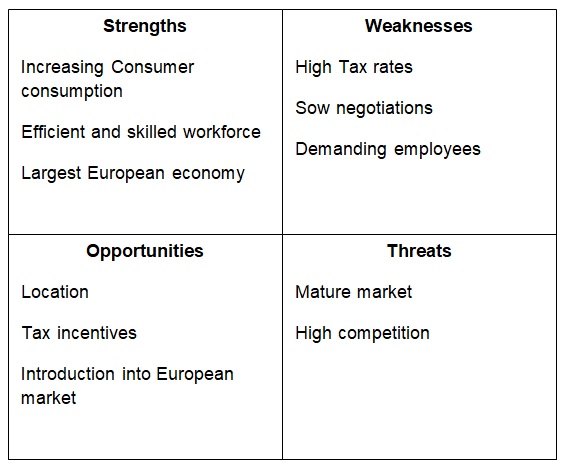Cultural differences between U.S. and Germany
Germany is one of the many member states of the European Union that are open to the global economy. The German culture is slightly different from the culture of the U.S., especially in terms of business transactions. As MICUS ventures into Germany, it is important to note that German nationals consider a business deal as mutually beneficial and that the central theme is usually the task. They value time and they focus on-time schedules and the tasks to be executed within the given period. They prefer making appointments before meeting anyone in business so that they can schedule the meeting and its agenda. Lastly, Germany is characterized by the slow process of decision making and the correspondent should be in Germany while undertaking the business deal. Therefore, MICUS should be aware of these factors as it ventures in Germany. It is noteworthy to say that Germans have a strong sense of regional pride and that they value the reputation of being industrious. Due to this, their mode of expressing their thoughts is direct and there is a separation between private and public relations. Therefore, based on cultural dimensions, Germany is considered a country with a low power distance, high individualism, masculinity, and uncertainty avoidance (Saunders, 2010).
Risk Assessment of the political-legal Environment
Politically, the German economy is the largest in Europe and it is the fourth largest in the world. To enhance the country’s good business environment is the fact that about 40 Fortune 500 companies have their headquarters in Germany, implying that the country has a stable political environment that is favorable to businesses (DeNike, 2010). The country is politically stable as the German president who is the head of the state and the head of government Chancellor Angela Merkel has maintained the stability of the country since elections are conducted after every five years.
Trade Barriers
There are few barriers to trade for foreign firms that wish to operate in Germany. MICUS is not restricted by Germany’s participation in the EU’s common agricultural policy. In addition, Germany has restrictions on biotech agricultural products that are manufactured either within or outside the country. However, the country is friendly and has always encouraged the EU to reduce trade restrictions.
Despite the restrictions, the German market remains attractive to investors outside the country such as the U.S. Although some investors point out that doing business in Germany is costly, the German government has ensured that productivity is high, there is labor that is highly skilled, and that the country provides quality engineering. These factors together with the ability of first-class manufacture and strategic location in the EU are some benefits that MICUS will realize after its investment in Germany.
Potential Risks in Management Style in Germany
The World Bank ranks Germany 88 out of the 183 states with regard to ease the ease of establishing a business. Establishing a business in the country takes about 15 days and involves 9 different procedures. German-American business groups have been established in the country to help ease coordination in terms of management of the business thereby minimizing the differences in management styles depicted by the two countries. Some of the groups include the German-American business Association, American-German Business Club, and the Germany-U.S. career center. Therefore, as MICUS ventures in Germany, it will receive help from the Germany-U.S. career center that will reduce the risk of management styles (DeNike, 2010).
Germany’s SWOT

Poor Integration Strategies
Integration is a significant aspect of any multination corporation since it determines the ability of the expatriates to integrate with the local culture in Germany. MICUS will find it less difficult to integrate with German culture since there are groups in place to help any firm venturing in Germany to easily integrate with the local culture. Integration could involve MICUS Corporation hiring German employees that fully understand the local culture.
Inadequate communication
Communication is a significant aspect of the modern world and it is significant in business management. The modern world is accompanied by modern advanced technology that has made the world to become a global village (Saunders, 2010). Therefore, the challenge of communication is no longer a major issue in the management of multinational corporations. In fact, increased communication is one reason that firms can effectively manage their subsidiaries from abroad without decentralizing offices. However, caution has to be taken that physical presence is effective for the effective execution of tasks (Harrel, 2008).
Marketing and Promotion Strategies
Marketing is a significant aspect of any organization and MICUS must not ignore its dominant nature in the industry. The company operates in the engineering sector by providing parts to other manufacturers. Though dominant in the U.S., it can increase its market share by engaging in advertising and promoting its parts through print media, broadcast media, and electronic media. The electronic media will involve MICUS developing a website that is specifically meant for the German market in the German language (Mohan, 2005).
HR-related areas of Interest
Human resources areas of interest to MICUS are cultural areas whereby the firm is venturing into a foreign country with a foreign culture. However, the issue of human resources for the German subsidiary and their management will be solved when the firm hires German professionals that understand the local culture. In addition, the help offered by German-American groups regarding doing business in Germany will be of great help to the firm.
References
DeNike, N. (2010). Market Entry Strategy: Germany. Web.
Harrel, G. (2008). Marketing: connecting with customers. Chicago: Chicago Education Press.
Mohan, R. (2005). International marketing. New York, NY: Oxford University Press.
Saunders, J. (2010). Marketing defined: Principles of Marketing. Wales: Will Publishers.